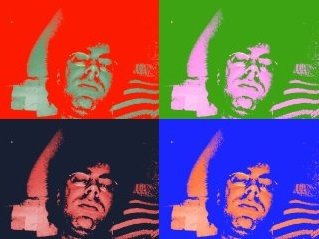
I don't usually discuss my personal life here, at least not in any great detail, but since an issue of (apparent) national concern has coincided with my recent family-holiday in Grand Rapids, I felt a few words of observation were in order. The body of former President Gerald R. Ford arrived in Grand Rapids on Tuesday, just hours after Karen and I were able to -- at the last possible moment -- struggle past the incompetent airline clerks at the Gerald R. Ford International Airport, a small and ineptly run outfit from which we barely escaped. We are never able to travel in and out of Grand Rapids without some awful episode, some dreadful display of incompetence that ruins our trip and sabotages whatever nice feelings we might still have for the scene of our youth and the people who inhabit it. The weather there is not nice. It is cold and damp and the sky is full of clouds. The land is flat, the buildings are low, and the dark clouded sky seems always to hang down and press forcefully into our souls.
The day after President Ford died, the front-page headline of the
Grand Rapids Press was "He Saved the Nation." President Ford was, as the Press would inform us in the following days, a "man of character," an "uncommon man," a "common man," a "Michigan man." One headline even called him "a national treasure." But I find myself repulsed by the legacy he has left us, of Christian forgiveness, phony honesty, and Eagle Scout salutes. Of
Michigan football and Midwestern normalcy. What an absurd lie, that the only unelected president in the history of our supposedly democratic union should be the most representative, the most down-to-earth citizen ever to take office. Maybe it’s even true! Actually, I'm beginning to fear it is -- which is even worse, by the way. To think that what the nation really wanted in the wake of Watergate was not understanding, but only someone honest-looking enough to make it all go away. This, I suppose, is his heritage: a legacy of covering up and burying, of obscuring the truth. Of looking the other way at the moment when it is most necessary to take a closer look. A legacy that -- I must admit -- is well suited to a man from Grand Rapids.
Watching the President's funeral on cable yesterday, I heard many references to "values." Middle American values, Christian values, the "values of a place like Grand Rapids." Every moment of the funeral had been scripted by the Ford family, but it was Grand Rapids that played the most important role, lending its so-called values to this fairy tale pageant about a Michigan everyman who accidentally became the Leader of the Free World. I won't specify why the values of Grand Rapids are, in my mind, far from unimpeachable. But I will say that the sight of Dick Cheney sitting in the pews of the church where I once watched my brother being baptized set my teeth on edge. Donald Rumsfeld giving a eulogy from the same podium where, two years ago, my father and uncle eulogized my grandfather -- this actually made me nauseous. This church "where the Fords worshipped since the 1940s," this Grace Episcopal Church, where I formerly recited the Lord's Prayer and sang hymns and never once saw anyone from the Ford family praying or worshiping or singing beside me, may no longer be a part of my life, but (even though I do not believe in God and have long since moved to New York) I find myself unable to leave it for good.
So I watched in morbid fascination, waiting for the moment when the President's casket would at last be dropped into the ground. I wanted the closure of that moment, of the final burial of thirty years of subsequent burying and covering up and turning a blind eye -- but, in the end, that moment never came. The cameras turned away. (A respectful gesture for the Ford family, certainly, but a kind of final denial as well -- a refusal to acknowledge the mortal facts one last time.) Instead I am left only with the following remark, which President Ford is said to have made shortly before his death:
"When I wake up at night and can't sleep, I always think of Grand Rapids."
Labels: funerals, Grand Rapids, home, Michigan


